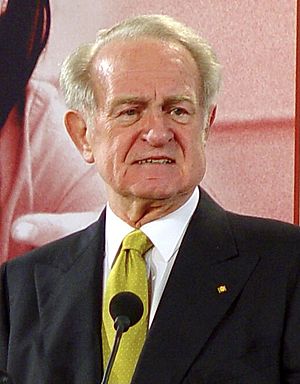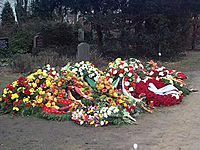Johannes Rau facts for kids
Quick facts for kids
Johannes Rau
|
|||||||||||||||||||||||||
|---|---|---|---|---|---|---|---|---|---|---|---|---|---|---|---|---|---|---|---|---|---|---|---|---|---|

Rau in 2004
|
|||||||||||||||||||||||||
| President of Germany | |||||||||||||||||||||||||
| In office 1 July 1999 – 30 June 2004 |
|||||||||||||||||||||||||
| Chancellor | Gerhard Schröder | ||||||||||||||||||||||||
| Preceded by | Roman Herzog | ||||||||||||||||||||||||
| Succeeded by | Horst Köhler | ||||||||||||||||||||||||
| Minister-President of North Rhine-Westphalia |
|||||||||||||||||||||||||
| In office 20 September 1978 – 9 June 1998 |
|||||||||||||||||||||||||
| Deputy |
|
||||||||||||||||||||||||
| Preceded by | Heinz Kühn | ||||||||||||||||||||||||
| Succeeded by | Wolfgang Clement | ||||||||||||||||||||||||
| President of the Bundesrat | |||||||||||||||||||||||||
| In office 1 November 1994 – 31 October 1995 |
|||||||||||||||||||||||||
| First Vice President | Klaus Wedemeier | ||||||||||||||||||||||||
| Preceded by | Klaus Wedemeier | ||||||||||||||||||||||||
| Succeeded by | Edmund Stoiber | ||||||||||||||||||||||||
| In office 1 November 1982 – 31 October 1983 |
|||||||||||||||||||||||||
| First Vice President | Hans Koschnick | ||||||||||||||||||||||||
| Preceded by | Hans Koschnick | ||||||||||||||||||||||||
| Succeeded by | Franz Josef Strauss | ||||||||||||||||||||||||
|
|||||||||||||||||||||||||
| Lord Mayor of Wuppertal | |||||||||||||||||||||||||
| In office 1969–1970 |
|||||||||||||||||||||||||
| Preceded by | Hermann Herberts | ||||||||||||||||||||||||
| Succeeded by | Gottfried Gurland | ||||||||||||||||||||||||
|
|||||||||||||||||||||||||
| Personal details | |||||||||||||||||||||||||
| Born | 16 January 1931 Wuppertal, Rhine Province, Free State of Prussia, Weimar Republic (now North Rhine-Westphalia, Germany) |
||||||||||||||||||||||||
| Died | 27 January 2006 (aged 75) Berlin, Germany |
||||||||||||||||||||||||
| Political party | Social Democratic Party (1957–2006) | ||||||||||||||||||||||||
| Other political affiliations |
All-German People's Party (1950–1957) | ||||||||||||||||||||||||
| Spouse | Christina Rau (née Delius) | ||||||||||||||||||||||||
| Children | 3 | ||||||||||||||||||||||||
| Occupation |
|
||||||||||||||||||||||||
| Signature | |||||||||||||||||||||||||
Johannes Rau (German: [joˈhanəs ˈʁaʊ]; 16 January 1931 – 27 January 2006) was an important German politician from the SPD. He served as the President of Germany from 1999 to 2004. Before that, he was the Minister-President of North Rhine-Westphalia, a German state, for a long time, from 1978 to 1998. During his time as Minister-President, he also led the Bundesrat, which is like Germany's second parliament, in 1982/83 and 1994/95.
Contents
Early Life and Career
Johannes Rau was born in Wuppertal, a city in Germany, on January 16, 1931. He was the third of five children. His family was very Protestant. As a student, Rau was involved in the Confessing Church, a group that bravely stood up against the Nazis.
In 1949, Rau finished school. He then worked as a publisher, especially for a Protestant youth publishing house.
Political Journey
Rau started his political journey with the All-German People's Party (GVP). This party was founded by Gustav Heinemann. The GVP wanted to reunite Germany and was active from 1952 until it closed down in 1957.
In 1958, Rau, who believed in peace (a pacifist), joined the Social Democratic Party of Germany (SPD) along with his mentor, Gustav Heinemann. He became very active in the SPD in Wuppertal. He served as a deputy leader of the SPD in Wuppertal. Later, he was elected to the City Council, where he worked from 1964 to 1978. He was also the leader of the SPD group in the council from 1964 to 1967. From 1969 to 1970, he served as the Mayor of Wuppertal.
Serving in the State Parliament
In 1958, Rau was first elected as a member of the Landtag, which is the state parliament of North Rhine-Westphalia. In 1967, he became the leader of the SPD group in the Landtag.
In 1970, he became the Minister of Science and Education in the state government. He quickly became known as someone who wanted to make things better. He helped start five new universities in North Rhine-Westphalia. He also created Germany's first distance learning university in Hagen. This university was inspired by the British Open University.
Leading North Rhine-Westphalia
In 1977, Rau became the leader of the SPD in North Rhine-Westphalia. In 1978, he became the Minister-President of the state. He held this important job until 1998. During his time, the SPD won four elections, becoming the strongest party in the Landtag each time. They even won an absolute majority three times, in 1980, 1985, and 1990. From 1995 onwards, Rau led a government made up of the SPD and the Greens party.
Rau also served twice as the President of the Bundesrat. This happened in 1982/83 and again in 1994/95.
Running for Chancellor and President
In 1987, Rau was the SPD's choice to become the Chancellor of Germany. However, he lost the election to Helmut Kohl's Christian Democrats (CDU).
In 1994, Rau ran to become President of Germany, but he lost to Roman Herzog.
President of Germany
In 1998, Rau stepped down from his roles as SPD chairman and Minister-President. On May 23, 1999, he was elected President of Germany by the Federal Assembly of Germany. He took over from Roman Herzog. On July 1, 2004, Horst Köhler became the new president.
Like all German Federal presidents, Rau was honored with a special military ceremony called a Großer Zapfenstreich. At his request, the hymn "Jesus bleibet meine Freude" (which means "that Jesus remain my Joy," also known as Jesu, Joy of Man's Desiring) was played.
In 2000, Rau made history by becoming the first German head of state to speak to the Knesset, which is the Israeli parliament, in German. This was a sensitive moment, and some Israeli members walked out. However, the Israeli President Moshe Katsav supported Rau. He praised Rau for helping to bring Germany and Israel closer together. Rau always worked hard to help Germany make peace with its past.
Death
Johannes Rau had heart problems for a long time. He passed away on January 27, 2006, just 11 days after his 75th birthday. His funeral was held on February 7 at the Dorotheenstadt cemetery in Berlin. It was a private ceremony with his closest family and friends.
Motto and Beliefs
Rau's main idea was "to reconcile, not divide." This meant he believed in bringing people together instead of separating them.
His personal motto was "teneo, quia teneor." This Latin phrase means "I hold because I am held." It shows his strong Christian faith and belief that he was supported by something greater.
In his speech after being elected president, Rau said, "I never want to be a nationalist but rather a patriot. A patriot is someone who loves his fatherland. A nationalist is someone who condemns the fatherland of others." This quote, which can be linked to the French writer Romain Gary, shows his belief in loving one's country without hating others.
Awards and Honors
Johannes Rau received 15 honorary doctorates from universities. In 2001, he was given the Leo Baeck Medal. This award recognized his work to promote kindness, understanding, and fairness in society.
Private Life
Rau was known for being a devoted Christian. Some people jokingly called him Bruder Johannes ("Brother John") because of his strong faith, but he sometimes used the term himself. He held positions in the Synod of the Evangelical Church in the Rhineland, which is part of the Evangelical Church in Germany.
On August 9, 1982, Rau married Christina Delius, who was born in 1956 and studied politics. Christina Rau is the granddaughter of Gustav Heinemann, who was also a former President of Germany and Rau's mentor. Johannes and Christina Rau had three children: Anna Christina (born 1983), Philip Immanuel (born 1985), and Laura Helene (born 1986).
In 2004, Rau had heart surgery to insert an artificial heart valve. A couple of months later, he had another surgery to remove a hematoma (a collection of blood) from his abdomen.
After he finished his term as president, Rau lived with his family in Berlin, the capital city. However, they also kept a house in his hometown of Wuppertal.
Honours
 Germany: Grand Cross Special Class of the Order of Merit of the Federal Republic of Germany
Germany: Grand Cross Special Class of the Order of Merit of the Federal Republic of Germany
Foreign Honours
 Austria: Grand Star of the Decoration of Honour for Services to the Republic of Austria (2004)
Austria: Grand Star of the Decoration of Honour for Services to the Republic of Austria (2004) Czech Republic: Collar of the Order of the White Lion
Czech Republic: Collar of the Order of the White Lion Denmark: Knight of the Order of the Elephant (2002)
Denmark: Knight of the Order of the Elephant (2002) Estonia: Collar of the Order of the Cross of Terra Mariana
Estonia: Collar of the Order of the Cross of Terra Mariana Italy: Knight Grand Cross with Collar Order of Merit of the Italian Republic
Italy: Knight Grand Cross with Collar Order of Merit of the Italian Republic Iceland: Grand Cross with Collar of the Order of the Falcon (2003)
Iceland: Grand Cross with Collar of the Order of the Falcon (2003) Latvia: 2nd Class, then, 1st Class with Chain of the Order of the Three Stars
Latvia: 2nd Class, then, 1st Class with Chain of the Order of the Three Stars Malta: Honorary Companions of Honour with Collar of the National Order of Merit
Malta: Honorary Companions of Honour with Collar of the National Order of Merit Norway: Grand Cross of the Order of St. Olav
Norway: Grand Cross of the Order of St. Olav Poland: Knight of the Order of the White Eagle
Poland: Knight of the Order of the White Eagle Slovakia: Grand Cross (or 1st Class) of the Order of the White Double Cross (2001)
Slovakia: Grand Cross (or 1st Class) of the Order of the White Double Cross (2001) Spain: Collar of the Order of Isabella the Catholic (2002)
Spain: Collar of the Order of Isabella the Catholic (2002) Sweden: Knight of the Royal Order of the Seraphim
Sweden: Knight of the Royal Order of the Seraphim Turkey: First Class of the Order of the State of Republic of Turkey (2000)
Turkey: First Class of the Order of the State of Republic of Turkey (2000) Vatican: Collar of the Order of Pope Pius IX
Vatican: Collar of the Order of Pope Pius IX- Olympic Order (2004)
- Leo Baeck Medal (1996)
See also
 In Spanish: Johannes Rau para niños
In Spanish: Johannes Rau para niños
 | Jewel Prestage |
 | Ella Baker |
 | Fannie Lou Hamer |


